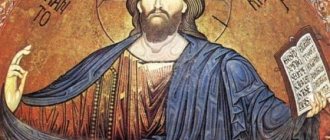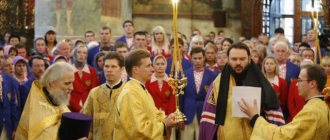How and by whom the penitential canon was created
The penitential discipline of Christians has been formed since ancient times. At the same time, corresponding prayers arose. Initially, they were performed during worship in the temple, and not privately. The canons in their current form are believed to have appeared around the 8th-9th centuries. Their authors were monks - St. Andrey Kritsky, Rev. John of Damascus, St. Cosma Maiyumsky and others. In Rus', the practice of reading canons spread only from the 14th century. Since that time, special liturgical books have been known - Canons.
Neither the time of creation nor the authorship of the canon of repentance to Jesus Christ is known exactly. Some attribute it to the famous commander and pious Christian, A.V. Suvorov. He allegedly created this text inspired by the Great Penitential Canon of St. Andrew of Crete, which is read in churches during Lent.
Such a text by Suvorov actually exists, but it differs quite seriously from the Canon to Jesus Christ found in the prayer books.
In any case, there is no doubt about the antiquity of the penitential text, its impact on the soul, which many believers experienced.
Epiphany
Previously, the Orthodox Church widely practiced the imposition of penance (church punishment) by a priest on a sinner when the latter repented of serious crimes (fornication, theft, masturbation, murder, abortion, betrayal, etc.)
There are three types of this punishment:
- bowing to the ground for a long time, several months;
- fasting (time of fasting is determined by the priest);
- reading a constantly repeated prayer for 40 days, most often the canon of repentance to the Lord Jesus Christ.
Now these traditions are becoming a thing of the past and there are few places where you can meet a clergyman punishing his parishioners in this way.
When to read
Orthodox prayer books contain the penitential canon for Christ both as part of the Rule for Holy Communion and separately. It is usually read:
- in preparation for confession, in order to properly prepare the soul for repentance;
- in preparation for the sacrament of Communion (Eucharist), in order to once again realize one’s unworthiness, to help oneself reverently approach the shrine;
- in any other case, when the soul is burdened by despondency, consciousness of sins, support from above is required.
In preparation for confession
When preparing for the Sacrament of Repentance, many find it difficult to see their spiritual state. Others, on the contrary, seeing their fall, despair, worry, grieve excessively for their sins, and stop hoping for God’s help. Time-tested church prayers, compiled by saints who have extensive spiritual experience and know how to correctly lead a person to repentance without plunging him into despair, help to find the right balance. One of these texts is the Canon of Jesus Christ.
Songs 1-3 of the canon are not so much a prayer to the Lord as a call to the believer for his soul to repent, to turn to God from worldly addictions. Here we remember possible human sins that remove us from the Lord. The believer is reminded of the Last Judgment, at which not so much God's Judgment will take place, but rather the judgment of the conscience of man himself over his soul.
But the sight of your constant falls should not plunge you into despair. Songs 4-8 remind the repentant of the goodness of the Creator and His love for people, of the wise structure of the world. The soul is called upon to renounce its sins and iniquities, think about eternity, and turn to its Creator - the only real meaning of human existence.
Finally, Canto 9 is the fervent request of a repentant person to the Mother of God, the Angels, and all the saints to beg God for help to correct a person’s life, because without this real changes are impossible. The culmination of repentance is the final prayer of repentance to Christ.
Canon and Communion
In preparation for the sacrament of the Eucharist, it is customary to read the penitential canon as part of the so-called Three-Canon, consisting of canons that can be read either one after the other, or combined:
- Christ;
- Mother of God;
- guardian angel
When reading the Three Canon together, the prayers are read as one canon. After the Three Canons comes the Rule for Holy Communion, placed in the prayer books.
In every sorrow
The Penitential Canon can also be read outside of preparation for the sacraments, under any difficult circumstances requiring the help of the Lord. It can be:
- illness;
- everyday troubles;
- difficulties of family and personal life.
The help that a believer receives when turning to Christ is, of course, not connected with the text being read as such. Repentance and humility, which the words of the ancient text encourage, change a person, his attitude towards God, his life. Heartfelt repentance calls upon the believer to receive God’s help.
From modern church life, there are known cases of even the healing of illnesses that accompanied the reading of this prayer book.
One of the priests says that a seriously ill woman came to him, practically dying of cancer. The priest blessed her to read the canon of repentance to Christ with contrition for her sins, and to confess more often. A few months later, this parishioner herself came to thank the priest: with God’s help, she not only changed her life, but was also healed of a fatal illness.
Repentance in Orthodoxy
Reading prayers is not the most important thing; it is important that a person feels a new state within himself. This is a desire to change, regret for one’s sins. For many, the first step is simply recognizing that you did something wrong. After all, modern people are taught to think that they themselves are the masters of life and are free to do whatever they want. This opinion leaves no room for God; He is not needed, because man himself knows everything. Therefore, it is difficult for many to abandon the practice of denouncing everyone except themselves in confession.
Repentance is not simply a declaration that a Christian has done wrong. There must be regret about what you have done. There is no need to reassure yourself that there were no serious sins (for example, adultery). An unkind word addressed to a neighbor can also hurt him greatly and lead to despondency. And this destroys the soul. The canon of repentance to our Lord Jesus Christ teaches that even thoughts can defile a person.
How to read correctly
The word "canon" is translated from Greek as "rule". This means a clear structure of this prayer book and certain rules for reading it.
Structure
The canon consists of 9 songs. Each song is preceded by an irmos, which talks about the events of the Holy History of the Old Testament related to the content of each song. Then follow the troparia - short prayers, in this case - penitential ones. Before the troparion there is a chorus, or refrain. It is short but expressive: “Have mercy on me, O God, have mercy on me.” The last troparion is dedicated to the Mother of God. It is preceded by a glorification of the Holy Trinity. There is no need for a chorus before it, but the words are pronounced: “Glory to the Father, and the Son, and the Holy Spirit, now and ever and unto ages of ages, amen.” In prayer books they are usually given in abbreviation: “Glory even now.”
It should be noted that the 3rd canto follows the first, that is, the 2nd canto is omitted. This is a feature of almost all canons. According to established tradition, 2 cantos recall the Lord’s suffering on the cross. Therefore, this song is absent from the canons read outside of Lent. It is found only in the Lenten Great Penitential Canon of St. Andrey Kritsky. Thus, the canon of Christ actually consists of 8 songs. In addition, it contains:
- Sedal after 3 songs;
- kontakion and ikos after the 6th song;
- final prayer to Christ.
Irmos, troparion, kontakion, sedalen
Modern people do not always understand the Greek names of the components of the canon, which require explanation. Irmos is the opening stanza of each of the 8 songs. Irmoses are taken from the biblical texts of the Old and New Testaments, reminiscent of the events of that time:
- 1 song - about the passage of the Jews through the Red Sea, “like dry land” (Ex. 15: 1-19);
- 3 songs – about the birth of the prophet Samuel (1 Samuel 2: 1-10)
- 4 songs - words of the prophet. Habakkuk about the future Birth of Christ (Hab. 3-19);
- 5 songs – the song of the prophet Isaiah (Is. 26: 9-19);
- 6 songs - the words of the prophet Jonah, who was swallowed by a whale for opposing the will of God and freed after repentance (Jonah 2:3-10);
- Songs 7 and 8 recall the miracle of three Jewish youths thrown into a burning furnace by the king of Babylon for confessing God, but saved by an Angel (Dan. 3: 26-88)
- Song 9 is taken from the Gospel (Luke 1: 46-79), dedicated to the Mother of God.
If you want to pray meaningfully, immersing yourself deeply in the content, before reading, you can briefly become acquainted with the biblical fragments mentioned in the irmos. Troparion is a short prayer chant that describes the essence of the holiday, containing an appeal to a saint or a prayer. In this case, the troparia are penitential.
Kontakion is also a short prayer. Previously, kontakia were large chants, the text of which was wound on a special stick, which was called a kontakion. Gradually the kontakion was reduced to a short prayer.
Sedalen is a chant during which believers could sit down. When the canons were sung during a church service, the sedals were preceded by long prayers and psalms, which were sung while standing. Then they could sit down for spiritual reflection on what they had heard.
Language
The text of the canon of repentance can usually be found in Church Slavonic, but in modern civil script. There are also translations of the canon into modern Russian. This helps to understand certain words that are no longer used, however, according to many believers, translation into a modern language is not without distortion of the meaning. Therefore, most believers prefer to read the penitential canon in Church Slavonic.
General reading rules
Pious tradition requires reading repentant prayers while standing. This is a feasible tribute to the all-holy God, and at the same time penitential work. Of course, if you cannot stand, you can read while sitting. You can also sit down while reading the sedalna, so named for this very reason. As with any other prayer, you should turn your face to the icon of Christ. It is believed that it is best to read out loud. This helps the believer to concentrate and drive away extraneous thoughts.
When reading during the service, irmos and, sometimes, choruses are sung in chorus, and troparia are read. The main voice is the 6th voice, sad, inciting contrition for sins. When reading at home, singing, of course, is not necessary; you can do it according to your capabilities. It is acceptable to read, rather than sing, all elements of the canon. The reading is preceded by the so-called “ordinary beginning,” which generally begins any prayer. This:
- a short prayer to Christ;
- the so-called Trisagion;
- prayer "Our Father".
After the prayer to Christ, short concluding prayers follow:
- prayer “It is worthy to eat”;
- Trisagion;
- Our Father;
- final short prayer to Christ.
If the canon is added to the prayer rule, there is no need to read the “usual beginning”. In addition to the general rules, there are features of reading in different cases.
Before Confession and Communion
As a rule, believers try to combine two sacraments - repentance and Communion, and confession precedes the Sacrament of Communion. Preparation for the sacraments requires some time. Modern confessors recommend preparing from 3 days to a week. At this time, it is recommended to read three canons - Christ, the Mother of God and the Guardian Angel. According to your strength and desire, you can read them:
- one per day;
- all three in sequence, one after the other;
- combined.
When reading together, at the beginning of each song, only one irmos is read (sung), from the canon to Christ. Then the troparia of all three canons with their choruses are read. The combined three canons are quite often placed in prayer books. Immediately the evening before Communion, you should read them again.
Homes in everyday life
When reading the canon at home outside of preparation for the sacraments, there are no special rules regarding the frequency of such prayer. The main thing is that the reading is not formal, but is accompanied by faith, repentance, and humility.
It is important to remember that liturgical texts were written by saints, so even simply reading them can have a beneficial effect on the soul.
My prayer "My story"
“I wasn’t religious before. I delved into this topic some time ago when I developed depression. It’s difficult to say why this happened: a lot of work, problems in the family, and I can’t have children with my husband. I accidentally ended up on one of the Orthodox sites (Optina Pustyn) and was looking for other information, but when I asked “how to help myself,” the search engine returned a page here.
Angelina, 29 years old, Yaroslavl
I delved into reading - I was literally drawn into it and sat there all night. I felt like this was exactly what I was looking for. I read about following, initial prayers, akathists. And then I come across the canons. There were different ones: Slavic, thanksgiving, the one that is read on the Savior and Easter. But I was attracted by the penitential canon. I read it for a long time, thoughtfully, and then repeated it faster. In the morning I fell asleep, and in the evening of the next day I woke up more alert. It felt like I had finally gotten enough sleep. For the first time I smiled in recent months. I realized then that a person cannot live without God in the Soul, he dies.”
Full text in Russian
Voice 6th
Song 1
Irmos: As Israel walked across the dry land, with footsteps across the abyss, seeing the persecutor Pharaoh drowned, let us sing a song of victory to God, crying out.
Chorus: Have mercy on me, God, have mercy on me.
Now I, sinful and burdened, have come to You, my Master and God; I don’t dare look at the sky, I just pray, the verb: give me, Lord, mind, so that I weep bitterly for my deeds.
Have mercy on me, God, have mercy on me.
Oh, woe to me, a sinner! I am more damned than all men; I have no repentance; Give me, Lord, tears, so that I may weep bitterly for my deeds.
Glory: Silly, wretched man, in laziness you waste time; think about your life, and turn to the Lord God, and weep bitterly for your deeds.
And now: Most Pure Mother of God, look at me, a sinner, and deliver me from the snare of the devil, and guide me on the path of repentance, so that I may weep bitterly for my deeds.
Song 3
Irmos: There is no one holy like You, O Lord my God, Who has lifted up the horn of Your faithful, O Greater One, and established us on the rock of Your confession.
Have mercy on me, God, have mercy on me.
Whenever thrones are set at the Great Judgment, then the affairs of all people will be exposed; woe will be the sinner, sent to torment; and then, my soul, repent from your evil deeds.
Have mercy on me, God, have mercy on me.
Glory: Woe to me, the great sinner, who have been defiled by deeds and thoughts, and have not a drop of tears from cruelty; now arise from the earth, my soul, and repent of your evil deeds.
And now: Behold, O Lady, Thy Son cries, and teaches us good, but I am a sinner who always flees from good; but You, O Merciful One, have mercy on me, so that I may repent of my evil deeds.
Sedalen, voice 6th
I think about the terrible day and weep for the deeds of my evil ones: how will I answer the Immortal King, or with what boldness will I look at the Judge, you prodigal one? Compassionate Father, Only Begotten Son and Holy Spirit, have mercy on me.
Glory, and now:
Theotokos: Bound now by many captive sins and held by fierce passions and troubles, I resort to You, my salvation, and cry out: help me, O Virgin, Mother of God.
Song 4
Irmos: Christ is my strength, God and Lord, the honest Church sings divinely, crying out from a pure meaning, celebrating the Lord.
Have mercy on me, God, have mercy on me.
The path here is wide to create pleasing sweets, but it will be bitter on the last day, when the soul will be separated from the body: beware of these, men, of the Kingdom for the sake of God.
Have mercy on me, God, have mercy on me.
Why have you offended the poor, taken bribes from a mercenary, disliked your brother, persecuted fornication and pride? Forsake this, my soul, and repent of the Kingdom for the sake of God.
Glory: Oh, foolish men, how long will you fly like a bee, collecting your wealth? Soon it will perish like dust and ashes: but seek more the Kingdom of God.
And now: Lady Theotokos, have mercy on me, a sinner, and strengthen me in virtue, and keep me, so that insolent death does not kidnap me unprepared; and bring me, O Virgin, to the Kingdom of God.
Song 5
Irmos: By Thy God's light, O Blessed One, illumine the souls of those who are in love with You, I pray, Lead You to the Word of God, the true God, from the darkness of sin.
Have mercy on me, God, have mercy on me.
Remember, accursed man, how you were enslaved by lies, slander, robbery, weakness, cruel beasts for the sake of sins; My sinful soul, is this what you wanted?
Have mercy on me, God, have mercy on me.
We tremble, for we have committed guilt for all: behold with your eyes, hear with your ears, speak with an evil tongue, betray everything to yourself; My sinful soul, is this what you desire?
Glory: You have accepted the fornicator and the repentant thief, O Savior, who alone have become burdened with sinful laziness and enslaved by evil deeds; My sinful soul, is this what you desire?
And now: Wonderful and quick helper to all people, Mother of God, help me, unworthy, for my sinful soul desires it.
Song 6
Irmos: The sea of life, raised in vain by the misfortunes of the storm, has flowed into Your quiet refuge, crying out to You: lift up my life from aphids, O Many-Merciful One.
Have mercy on me, God, have mercy on me.
I lived in prodigal life on earth and lost my soul to darkness, now I pray to You, Gracious Master: free me from the work of sowing the enemy, and give me the mind to do Your will.
Have mercy on me, God, have mercy on me.
Who creates things like I do? Just as a pig lies in feces, so I also serve sins. But You, Lord, pluck me from this infamy and give me heart to do Your commandments.
Glory: Arise, damned man, to God, remembering your sins, falling to the Creator, crying and groaning; He, who is merciful, will give you the mind to know His will.
And now: Virgin Mary, protect me from visible and invisible evil, Most Pure One, and accept my prayers, and I will convey them to Your Son, that He may give me the mind to do His will.
Kontakion
My soul, why are you rich in sins, why do you do the will of the devil, in what hope do you place your hope? Stop from these things and turn to God weeping, calling: Merciful Lord, have mercy on me, a sinner.
Ikos
Thoughts, my soul, the bitter hour of death and the Last Judgment of your Creator and God: The angels of evil will understand you, my soul, and lead you into eternal fire: for before you die, repent, crying: Lord, have mercy on me sinner.
Song 7
Irmos: The furnace was made by the angel as a venerable youth, and the Chaldeans received the scorching command of God, the tormentor exhorted them to cry out: Blessed art thou, O God of our father.
Have mercy on me, God, have mercy on me.
Do not trust, my soul, in perishable wealth and in unrighteous gatherings, for you will not leave all this to anyone, but cry out: have mercy on me, O Christ God, the unworthy.
Have mercy on me, God, have mercy on me.
Do not trust, my soul, in bodily health and fleeting beauty, for you see how the strong and the young die, but cry out: have mercy on me, O Christ God, the unworthy.
Glory: Remember, my soul, eternal life, the Kingdom of Heaven, prepared for the saints, and the pitch darkness and the wrath of God for the wicked, and cry: have mercy on me, O Christ God, the unworthy.
And now: Come, my soul, to the Mother of God and pray to her, for she is a quick Helper to those who repent, she will pray to the Son of Christ God, and she will have mercy on me, the unworthy.
Song 8
Irmos: From the flame of the saints you poured out dew and you burned the righteous sacrifice with water: you did everything, O Christ, just as you willed. We extol You forever.
Have mercy on me, God, have mercy on me.
Why shouldn’t I cry when I think about death, because I see my brother lying in the grave, inglorious and ugly? What do I drink and what do I hope for? Just grant me, Lord, before the end, repentance. (Twice)
Glory: I believe that you will come to judge the living and the dead, and all will stand in their rank, old and young, rulers and princes, virgins and priestesses; where will I find myself? For this reason I cry: grant me, Lord, before the end, repentance.
And now: Most Pure Mother of God, accept my unworthy prayer and save me from insolent death, and grant me repentance before the end.







